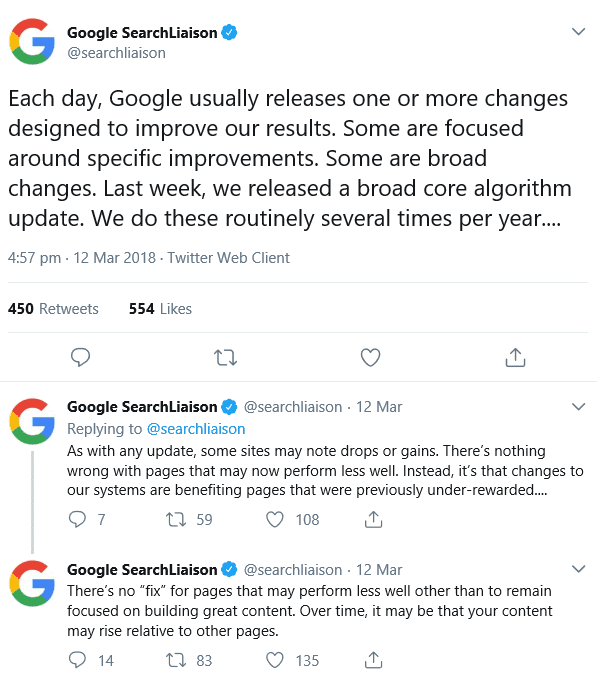On 1st August 2018, Google confirmed a “broad core algorithm update” and that it does these updates “several times per year.”
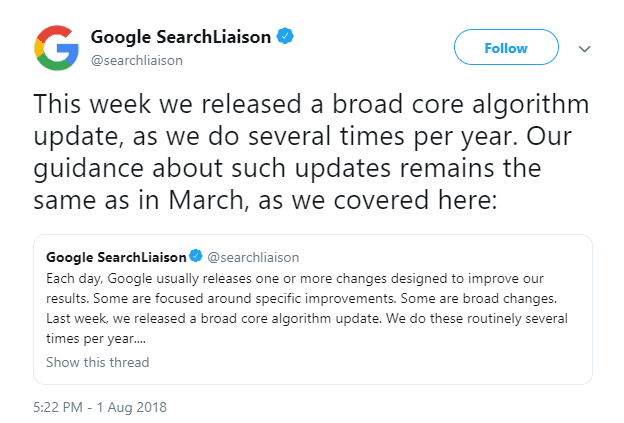
You can see their full Twitter thread here confirming this.
Unlike other yearly refreshes they mention though, this update was greeted with a few raised eyebrows, as a few days before Google made significant changes to their Google Quality Rater Guidelines for the first time in a year.
Naturally, webmasters linked these guideline revisions to this August update.
Related: A Short History of Google Algorithm Updates
While this 164-page resource doesn’t influence rankings directly, the ideas and guidelines they outline are a big signal of how Google considers certain topics and their quality. For that reason, our eCommerce SEO team set about to understand what it is Google are asking for when it comes to web best practice.
One of the most noticeable amendments in the Google Quality Rater Guidelines document relates to E-A-T and YMYL, but what do these acronyms mean?
Jump to:
- What is E-A-T?
- What is YMYL?
- Google search quality raters
- Who has E-A-T/YMYL affected?
- How to recover from E-A-T/YMYL update
What is E-A-T?
E-A-T stands for:
- Expertise
- Authoritativeness
- Trustworthiness
Google’s revised search quality rating guidelines make constant mention of expertise, authority and trust (EAT) as a signifier of high-quality content.
Google doesn’t define clear examples of E-A-T, however, it does provide guidelines for their search quality raters to follow when assessing websites from this perspective:
- “High E-A-T medical advice should be written or produced by people or organizations with appropriate medical expertise or accreditation. High E-A-T medical advice or information should be written or produced in a professional style and should be edited, reviewed, and updated on a regular basis.”
- “High E-A-T news articles should be produced with journalistic professionalism—they should contain factually accurate content presented in a way that helps users achieve a better understanding of events. High E-A-T news sources typically have published established editorial policies and robust review processes.”
- “High E-A-T information pages on scientific topics should be produced by people or organizations with appropriate scientific expertise and represent well-established scientific consensus on issues where such consensus exists.”
- “High E-A-T financial advice, legal advice, tax advice, etc., should come from trustworthy sources and be maintained and updated regularly.”
- “High E-A-T advice pages on topics such as home remodelling (which can cost thousands of dollars and impact your living situation) or advice on parenting issues (which can impact the future happiness of a family) should also come from “expert” or experienced sources that users can trust.”
- “High E-A-T pages on hobbies, such as photography or learning to play a guitar, also require expertise.”
Source – Google Quality Rater Guidelines
It’s clear that following the guideline changes, Google wants to serve only the most accurate and most respected content possible around serious and important searches.
What is YMYL?
The Google Quality Rater Guidelines now defines “Your Money or Your Life” as pages that “could potentially impact the future happiness, health, financial stability, or safety of users”.
This is important to Google as “low-quality YMYL pages could potentially negatively impact users’ happiness, health, financial stability, or safety”.
This mirrors the updates to the EAT guidelines and again shows that Google wants correct and trustworthy results around life affecting queries.
The following are examples of YMYL pages from the new Google Quality Rater Guidelines:
- “Shopping or financial transaction pages: webpages that allow users to make purchases, transfer money, pay bills, etc. online (such as online stores and online banking pages).
- “Financial information pages: webpages that provide advice or information about investments, taxes, retirement planning, home purchase, paying for college, buying insurance, etc.”
- “Medical information pages: webpages that provide advice or information about health, drugs, specific diseases or conditions, mental health, nutrition, etc.”
- “Legal information pages: webpages that provide legal advice or information on topics such as divorce, child custody, creating a will, becoming a citizen, etc.”
- “News articles or public/official information pages important for having an informed citizenry: webpages that include information about local/state/national government processes, policies, people, and laws; disaster response services; government programs and social services; news about important topics such as international events, business, politics, science, and technology; etc. Please use your judgment and knowledge of your locale. Keep in mind that not all news articles are necessarily considered YMYL.”
- “Other: there are many other topics that you may consider YMYL, such as child adoption, car safety information, etc. Please use your judgment.”
Now we have identified the major guideline changes, but who is reviewing websites on things like E-A-T and YMYL?
Google search quality raters
What is a Google search quality rater?
According to Search Engine Land,
“Google contracts with over 10,000 search quality raters worldwide to evaluate its search results.
“Raters are given actual searches to conduct, drawn from real searches that happen on Google. They then rate the quality of pages that appear in the top results”
These Search Quality Raters are tasked with reviewing dozens of websites per month and were likely an integral component of the August update that focused on E-A-T and YMYL.
Who has E-A-T/YMYL affected?
According to Mozcast temperatures, websites in the health industry were among some of the hardest hit in the August update:
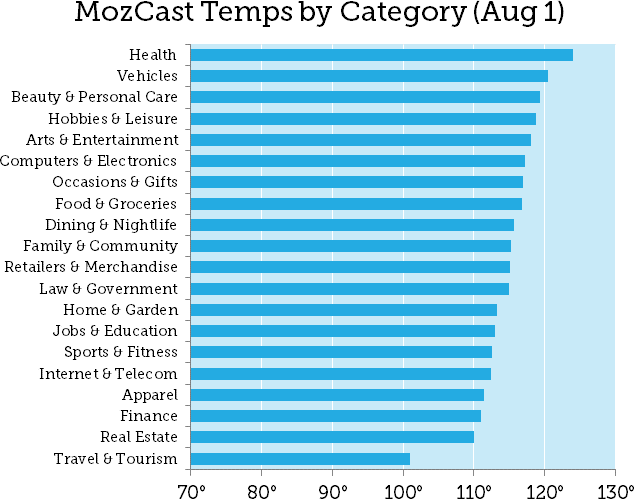
Sistrix also had some great data on the winners and losers from this August update:
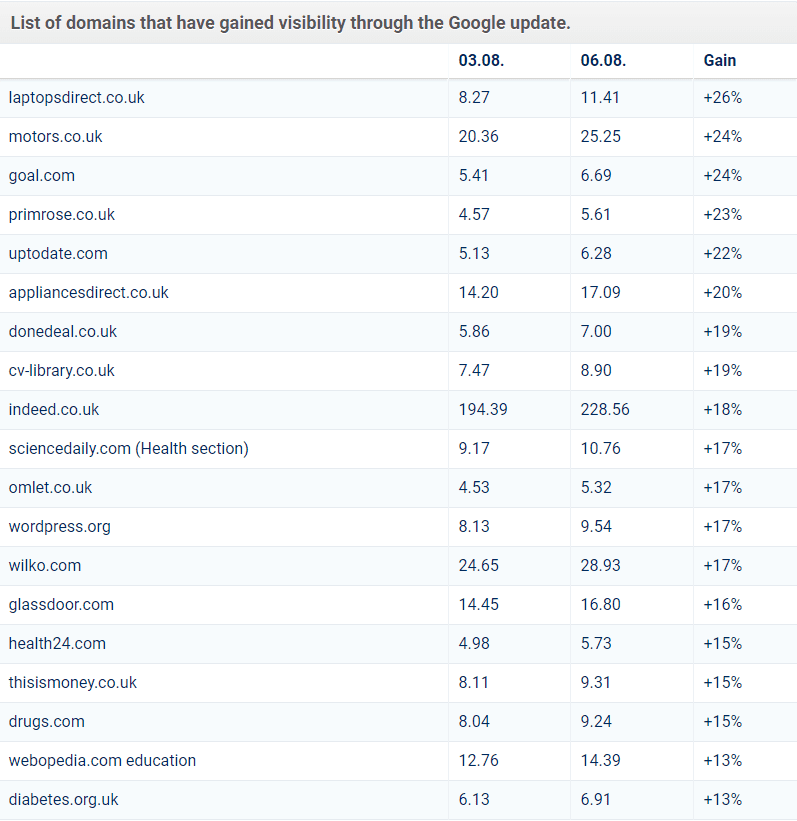
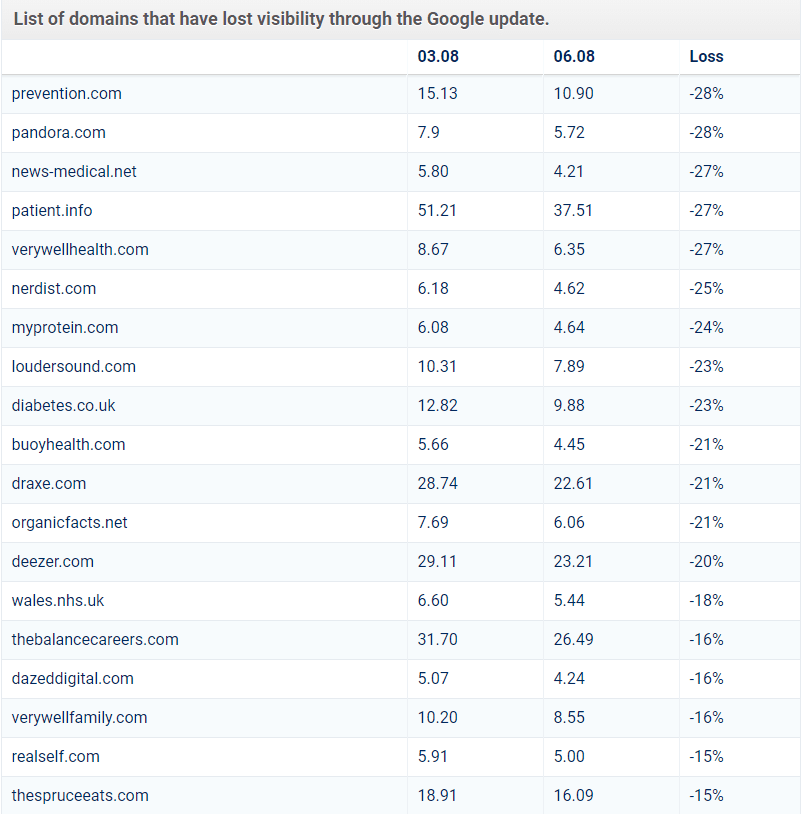
We can see a clear correlation between the type of sites affected and the updated guidelines in the Google Quality Rater resource.
For example, there was clear instruction within the guidelines on what to look for when assessing medical content.
As a reminder, Google said “medical advice should be written or produced by people or organizations with appropriate medical expertise or accreditation. High E-A-T medical advice or information should be written or produced in a professional style and should be edited, reviewed, and updated on a regular basis.”
Therefore, it’s unsurprising that a few days after this guideline was revised, the performance of several medic sites was affected.
Related: How To Diagnose Your Ranking Drops

